Azure Cosmos DB for PostgreSQL

Azure Cosmos DB for PostgreSQL is a managed service for PostgreSQL powered by the Citus open source extension which enables you to build highly scalable relational apps. This integration helps in identifying configurations errors, analyzing executed statements, and monitoring resource usage of individual nodes in a cluster.
Log and metric types
For Azure Cosmos DB for PostgreSQL, you can collect the following logs and metrics:
- PostgreSQL Server Logs. These logs are available for every node of a cluster and can be used to identify, troubleshoot, and repair configuration errors and suboptimal performance.
- Activity logs. Provides insight into any subscription-level or management group level events that have occurred in Azure. To learn more, refer to the Azure documentation.
- Metrics. These metrics are available in Microsoft.DBforPostgreSQL/serverGroupsv2 namespace. For more information on supported metrics, refer to the Azure documentation.
Setup
Azure service sends monitoring data to Azure Monitor, which can then stream data to Eventhub. Sumo Logic supports:
- Logs collection from Azure Monitor using our Azure Event Hubs source.
- Metrics collection using our Azure Metrics Source.
You must explicitly enable diagnostic settings for each Azure Cosmos DB for PostgreSQL cluster you want to monitor. You can forward logs to the same event hub provided they satisfy the limitations and permissions as described here.
When you configure the event hubs source or HTTP source, plan your source category to ease the querying process. A hierarchical approach allows you to make use of wildcards. For example: Azure/CosmosDBforPostgreSQL/Logs, Azure/CosmosDBforPostgreSQL/Metrics.
Configure collector
Create a hosted collector if not already configured and tag the tenant_name field. You can get the tenant name using the instructions here. Make sure you create the required sources in this collector. 
Configure metrics collection
To set up the Azure Metrics source in Sumo Logic, refer to Azure Metrics Source.
Configure logs collection
In this section, you will configure a pipeline for shipping diagnostic logs from Azure Monitor to an Event Hub.
-
To set up the Azure Event Hubs source in Sumo Logic, refer to the Azure Event Hubs Source for Logs.
-
To create the diagnostic settings in Azure portal, refer to the Azure documentation. Perform the steps below for each Azure Redis cache account that you want to monitor.
- Choose Stream to an event hub as the destination.
- Select
allLogs. - Use the Event Hub namespace and Event Hub name configured in the previous step in the destination details section. You can use the default policy
RootManageSharedAccessKeyas the policy name.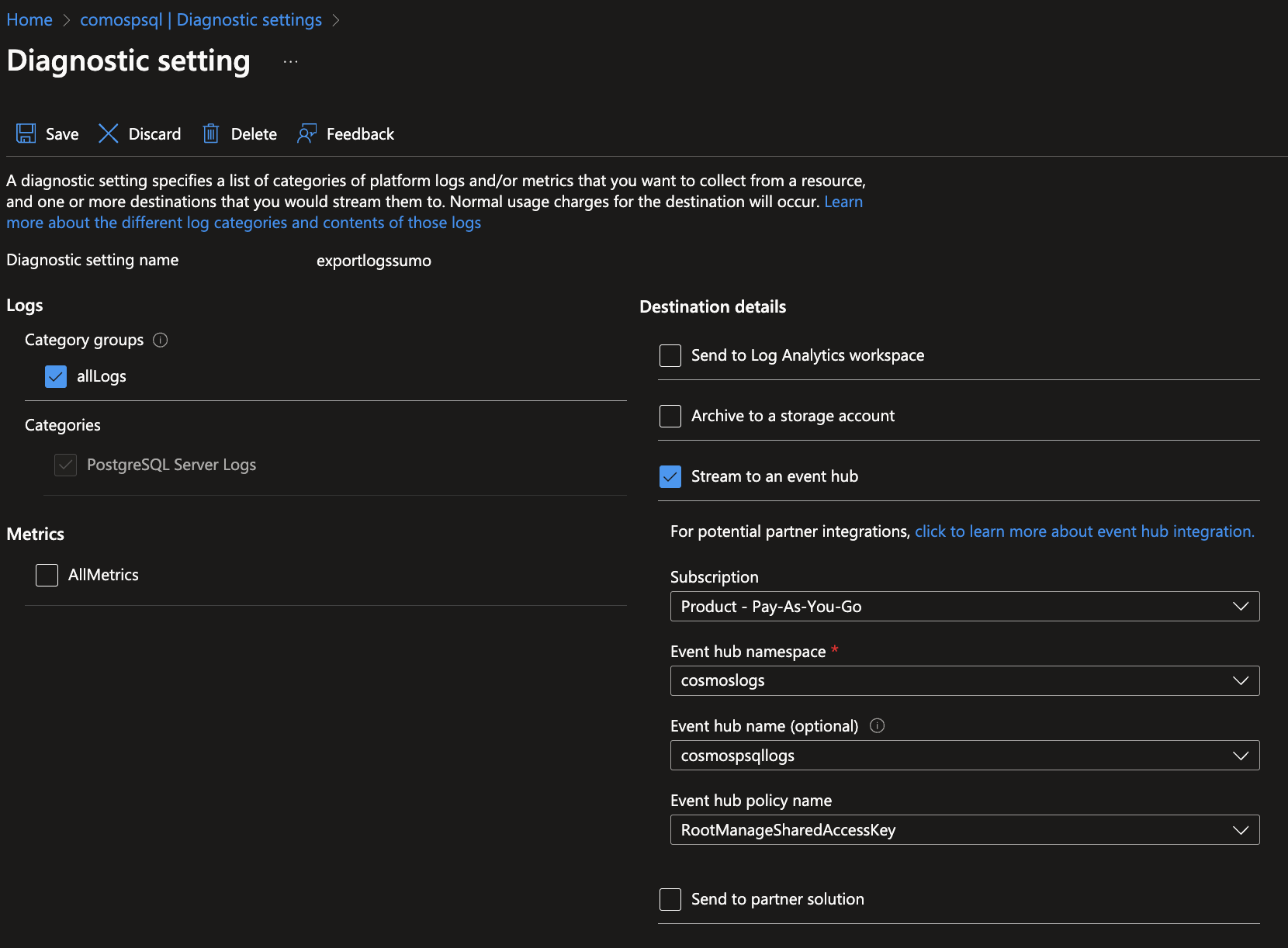
-
Set server parameters as given below:
log_statement. Select DDL.log_lock_waits. Set to ON. If required, you can also configuredeadlock_timeout.log_connections. Set to ON.log_disconnections. Set to ON.log_duration. Set to ON. If required, you can also configurelog_min_duration_statement.log_hostname. Set to ON.log_min_error_statement. Set to INFO.log_min_messages. Set to INFO.log_line_prefix. Set to%m [%p][%v] : %q[app=%a].
-
Tag the location field in the source with right location value.
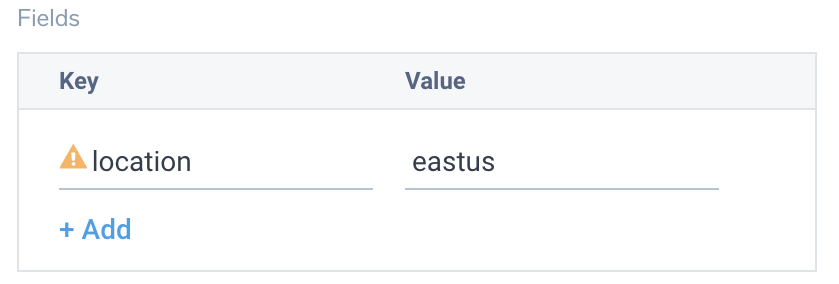
Activity logs (optional)
To collect activity logs, follow the instructions here. If you are already collecting activity logs for a subscription, you can skip this step.
Since this source includes logs from multiple regions, do not tag it with the location tag.
Installing the Azure Cosmos DB for PostgreSQL app
Now that you have set up data collection, install the Azure Database for PostgreSQL Sumo Logic app to use the pre-configured dashboards that provide visibility into your environment for real-time analysis of overall usage.
To install the app, do the following:
Next-Gen App: To install or update the app, you must be an account administrator or a user with Manage Apps, Manage Monitors, Manage Fields, Manage Metric Rules, and Manage Collectors capabilities depending upon the different content types part of the app.
- Select App Catalog.
- In the 🔎 Search Apps field, run a search for your desired app, then select it.
- Click Install App.
note
Sometimes this button says Add Integration.
- Click Next in the Setup Data section.
- In the Configure App section of your respective app, complete the following field.
- Index. Specify value for _index if the collection is configured with custom partition. Learn more. Default value is set to
sumologic_default(default partition)
- Index. Specify value for _index if the collection is configured with custom partition. Learn more. Default value is set to
- Click Next. You will be redirected to the Preview & Done section.
Post-installation
Once your app is installed, it will appear in your Installed Apps folder, and dashboard panels will start to fill automatically.
Each panel slowly fills with data matching the time range query received since the panel was created. Results will not immediately be available but will be updated with full graphs and charts over time.
As part of the app installation process, the following fields will be created by default:
tenant_name. This field is tagged at the collector level. You can get the tenant name using the instructions here.location. The region the resource name belongs to.subscription_id. ID associated with a subscription where the resource is present.resource_group. The resource group name where the Azure resource is present.provider_name. Azure resource provider name (for example, Microsoft.Network).resource_type. Azure resource type (for example, storage accounts).resource_name. The name of the resource (for example, storage account name).service_type. Type of the service that can be accessed with an Azure resource.service_name. Services that can be accessed with an Azure resource (for example, in Azure Container Instances the service is Subscriptions).
Viewing the Azure Cosmos DB for PostgreSQL dashboards
All dashboards have a set of filters that you can apply to the entire dashboard. Use these filters to drill down and examine the data to a granular level.
- You can change the time range for a dashboard or panel by selecting a predefined interval from a drop-down list, choosing a recently used time range, or specifying custom dates and times. Learn more.
- You can use template variables to drill down and examine the data on a granular level. For more information, see Filtering Dashboards with Template Variables.
- Many of the Next-Gen apps allow you to provide the Index at the installation time and a default value for this key (sumologic_default). Based on your input, the app dashboards will be parameterized with a dashboard variable, allowing you to change the data partition queried by all panels. This restricts the query scope of all the dashboard queries to a specific data partition.
Overview
The Azure Cosmos DB for PostgreSQL - Overview dashboard provides details about replication lag, active connections and query duration distribution across clusters and servers.
Use this dashboard to:
- Track replication lag across replica clusters.
- Analyse query execution duration distribution and common errors across all servers.
- Identify clusters with max cpu usage, memory usage, and storage usage.
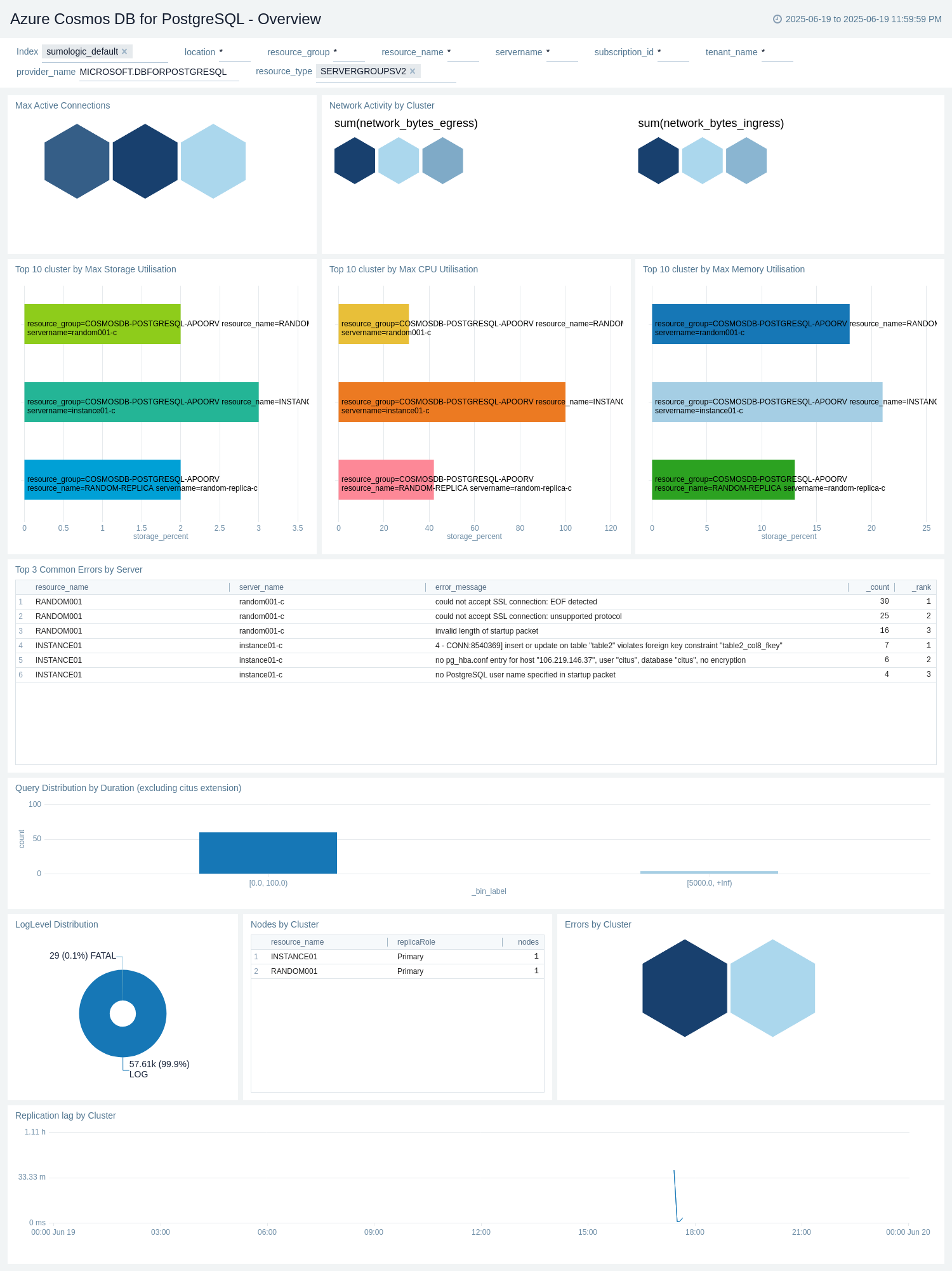
Network
The Azure Cosmos DB for PostgreSQL - Network dashboard provides insights on active connections, failed Ccnnections, and network activity including ingress and egress bytes.
Use this dashboard to:
- Quickly identify connection errors across clusters.
- Monitor active connections, ingress, and egress trends across clusters.
- Identify abnormally long sessions.
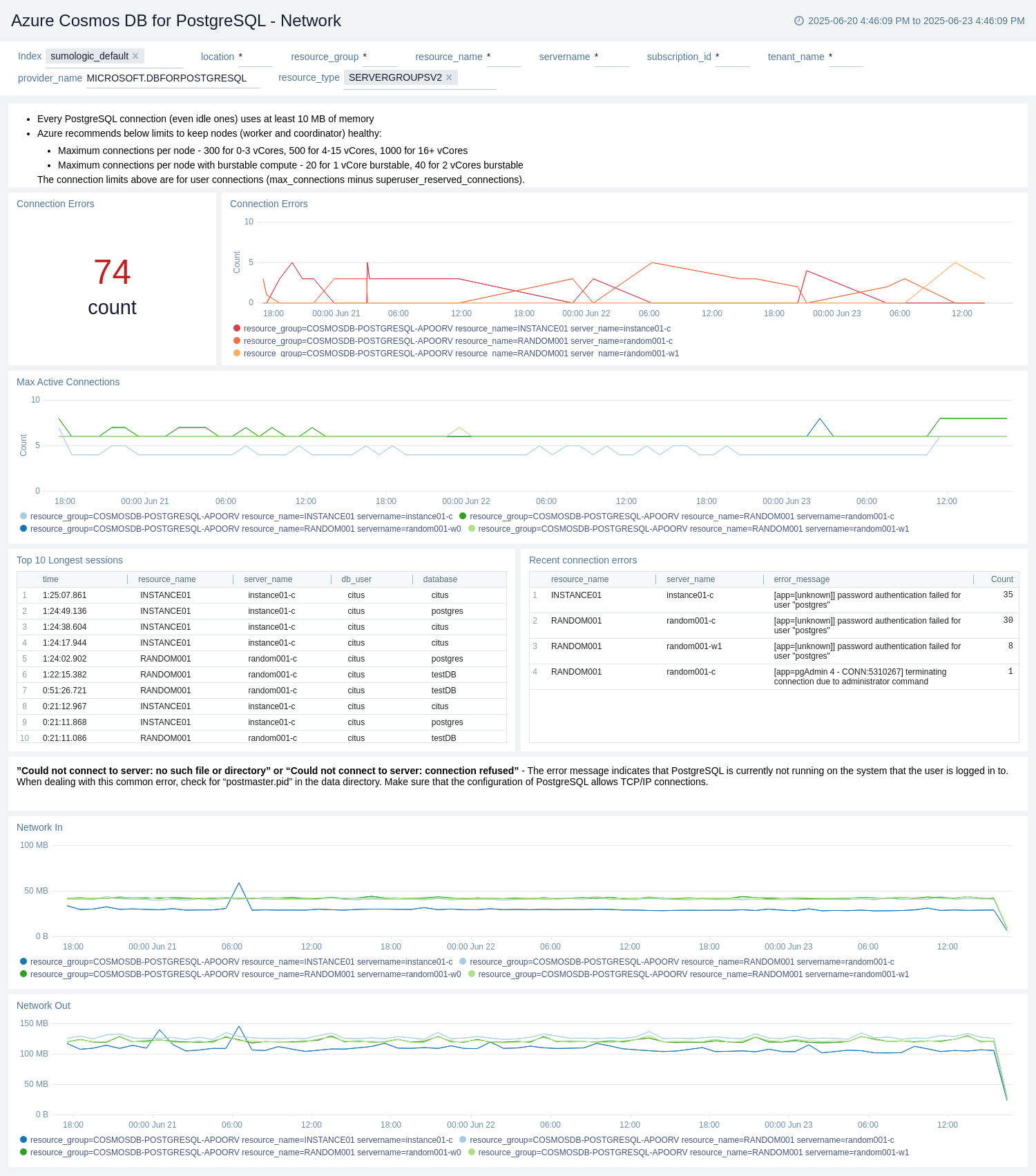
Errors
The Azure Cosmos DB for PostgreSQL - Errors dashboard provides insight into server error logs by specifically monitoring errors and database shutdown/start events.
Use this dashboard to:
- Quickly identify top errors across clusters and servers.
- Monitor error trends and distribution across clusters and servers.
- Identify unexpected database shutdown or start activity.
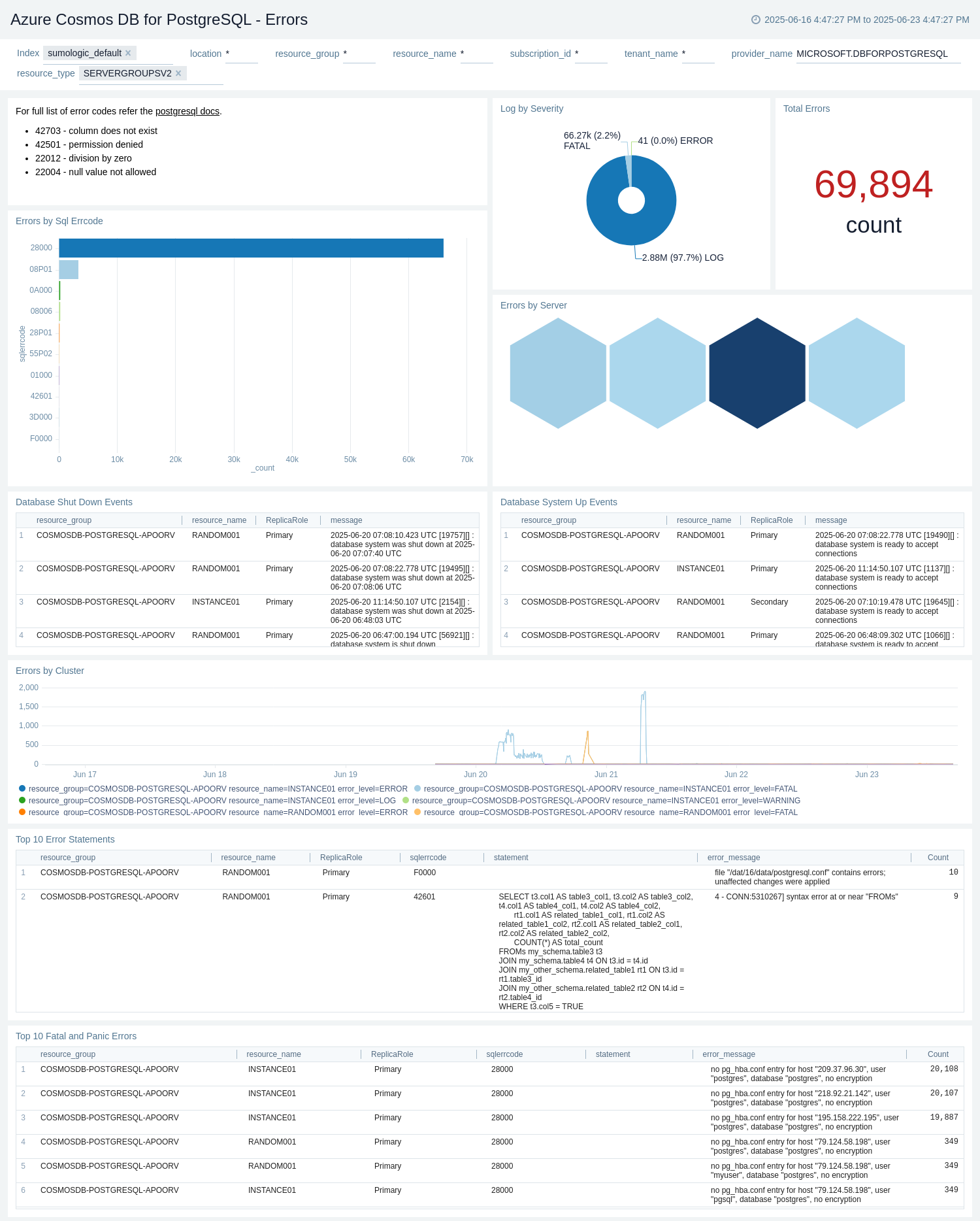
Security
The Azure Cosmos DB for PostgreSQL - Security dashboard provides insight into locations of incoming connections, failed authentications, and top database errors and warnings.
Use this dashboard to:
- Monitor incoming connections, failed authorization requests, and failed authentication requests.
- Track the user performing failed authentication attempts across servers.
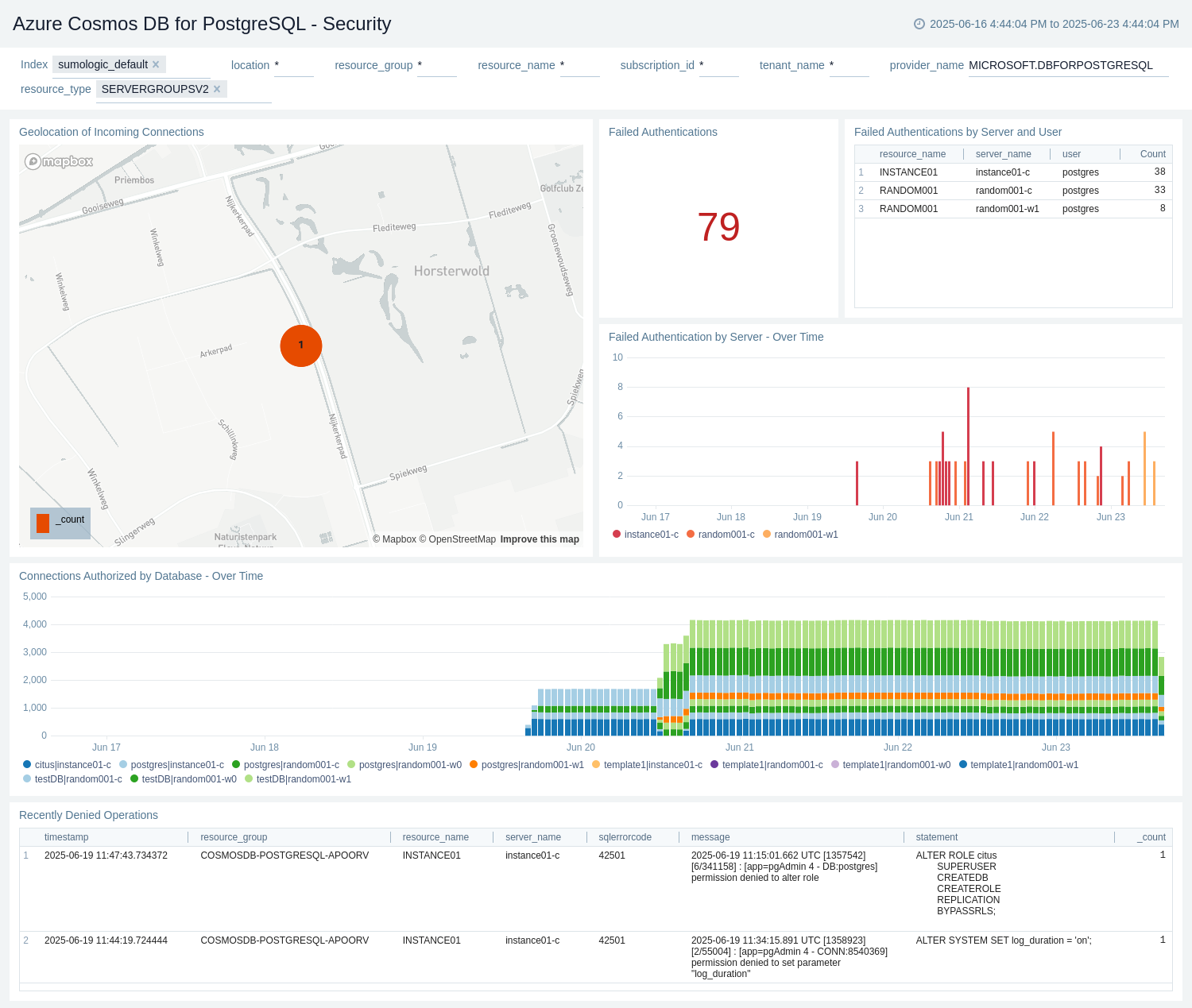
Storage
The Azure Cosmos DB for PostgreSQL - Storage dashboard provides details about data usage, document count, and physical partition size by database.
Use this dashboard to:
- Monitor the storage utilisation to decide on scaling up storage or scaling out the nodes if this metric exceeds 85 percent consistently.
- Track total storage used across the clusters.
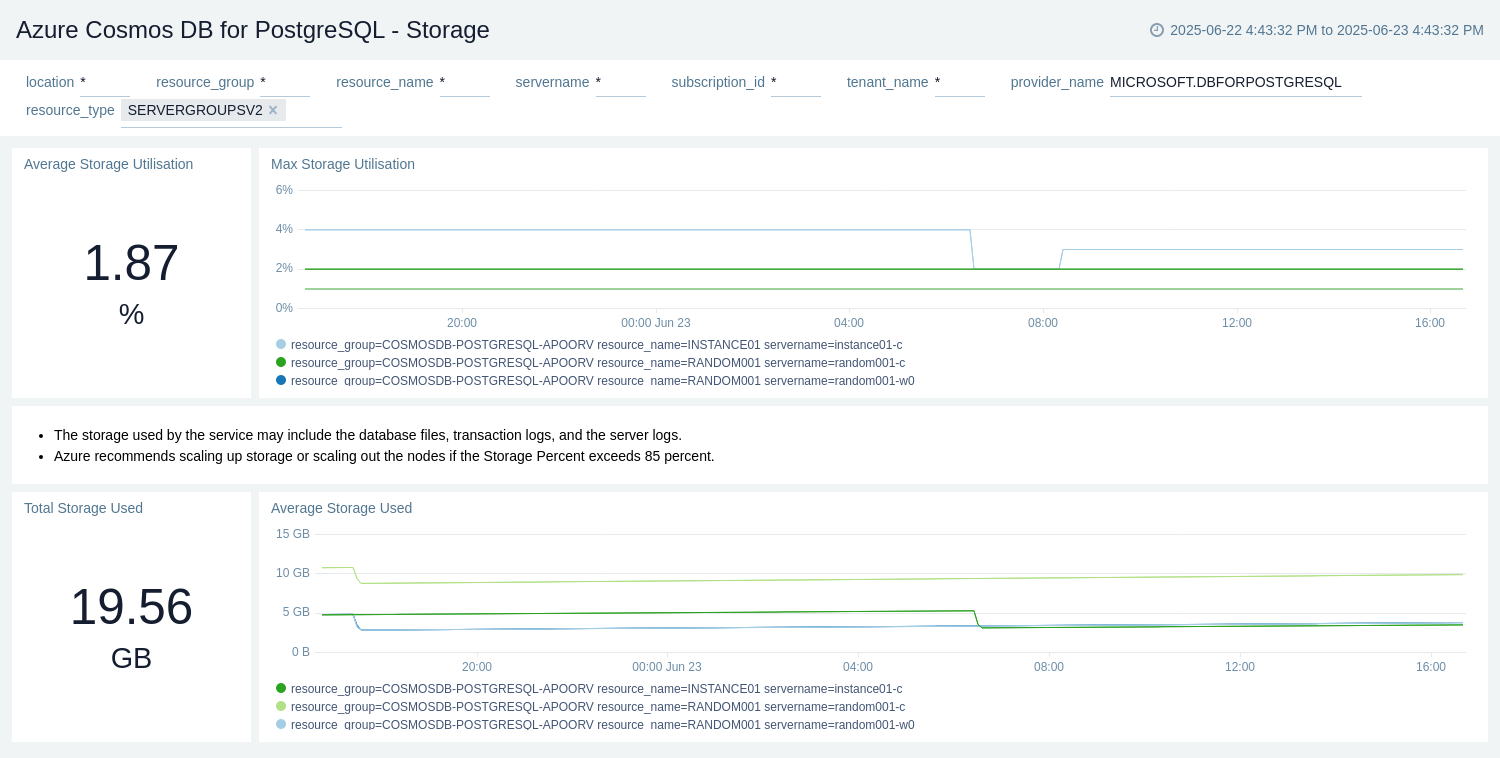
Performance
The Azure Cosmos DB for PostgreSQL - Performance dashboard provides insights into the performance of your Azure Cosmos DB for PostgreSQL databases. This includes metrics on query duration, server side latency, and failed queries.
Use this dashboard to:
- Track clusters approaching the maximum IOPS capacity, to decide on adding worker nodes.
- Identify clusters using a high percentage of the clusters available memory to decide on scaling up the compute if this metric consistently exceeds 90 percent.
- Monitor the CPU usage to decide on scaling up the compute if this metric exceeds 95 percent consistently.
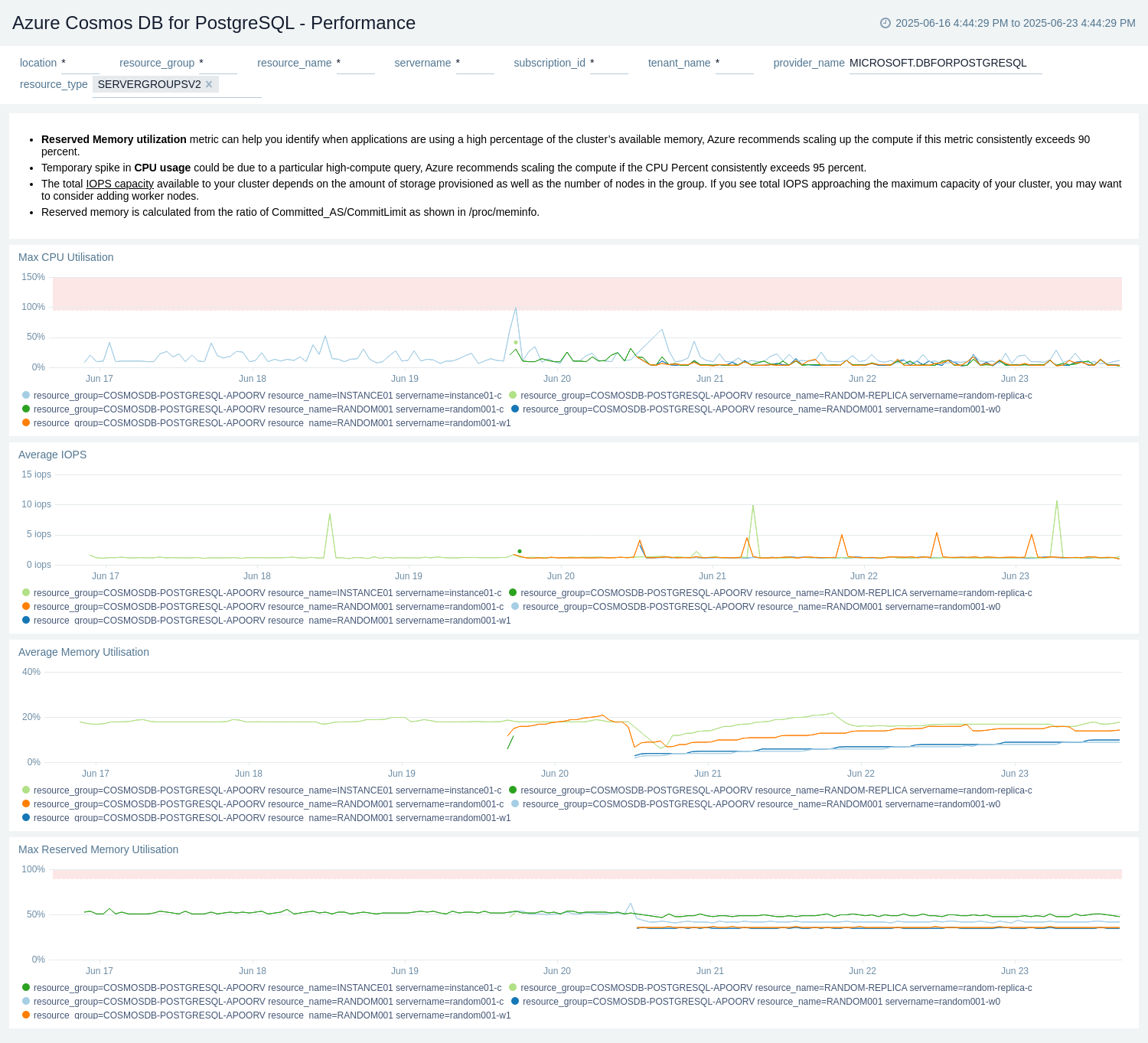
Queries
The Azure Cosmos DB for PostgreSQL - Queries dashboard provides insights into the queries executed in your Azure Cosmos DB for PostgreSQL databases.
Use this dashboard to:
- Analyze query execution duration distribution across servers.
- Identify query statements with errors.
- Monitor spike in query duration.
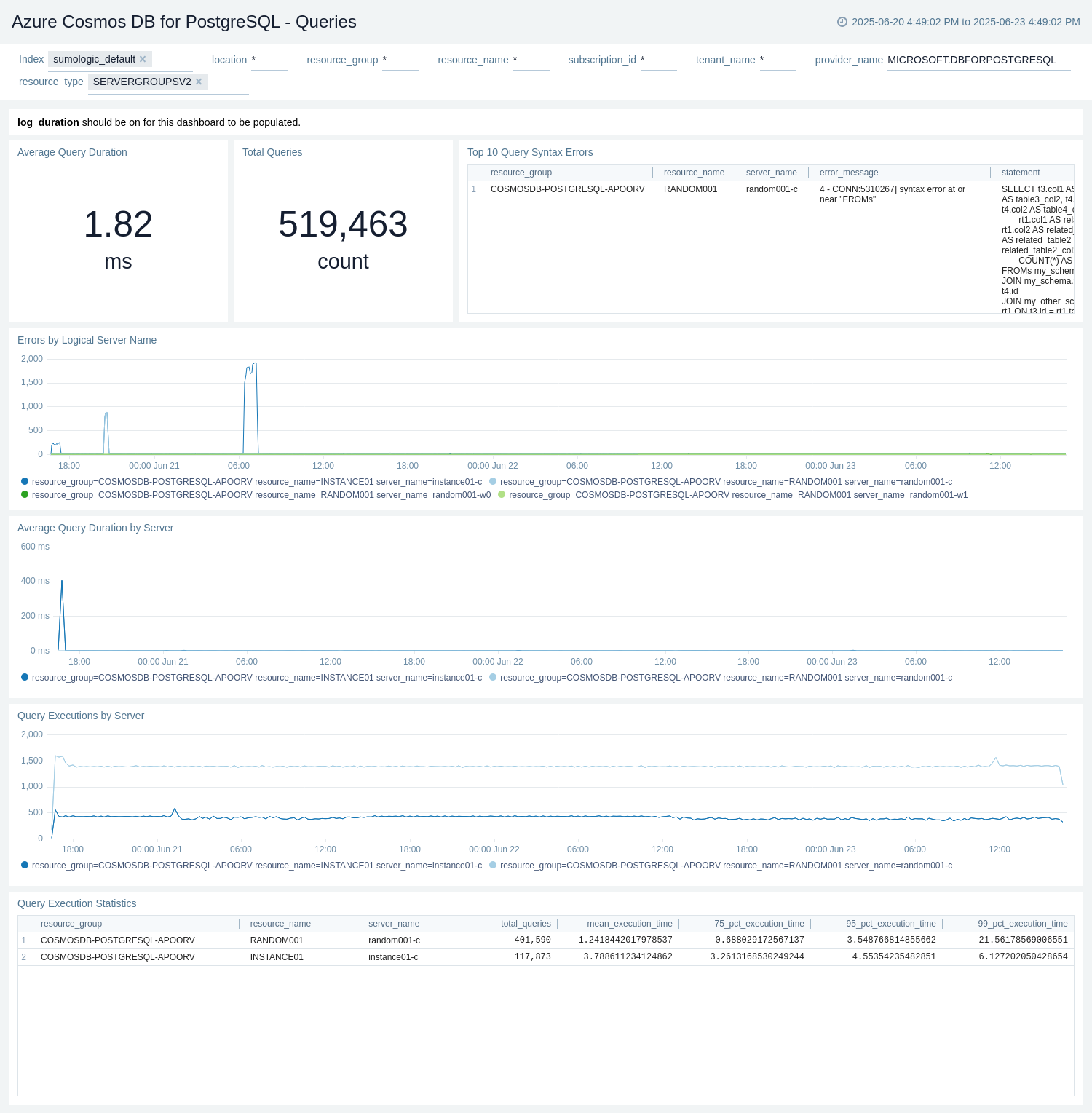
Health
The Azure Cosmos DB for PostgreSQL - Health dashboard provides information of any service health incidents or resource health events associated with Azure Cosmos DB for PostgreSQL accounts in your azure account.
Use this dashboard to:
- View recent resource and service health incidents.
- View distribution of service and resource health by incident type.
- Monitor service availability.
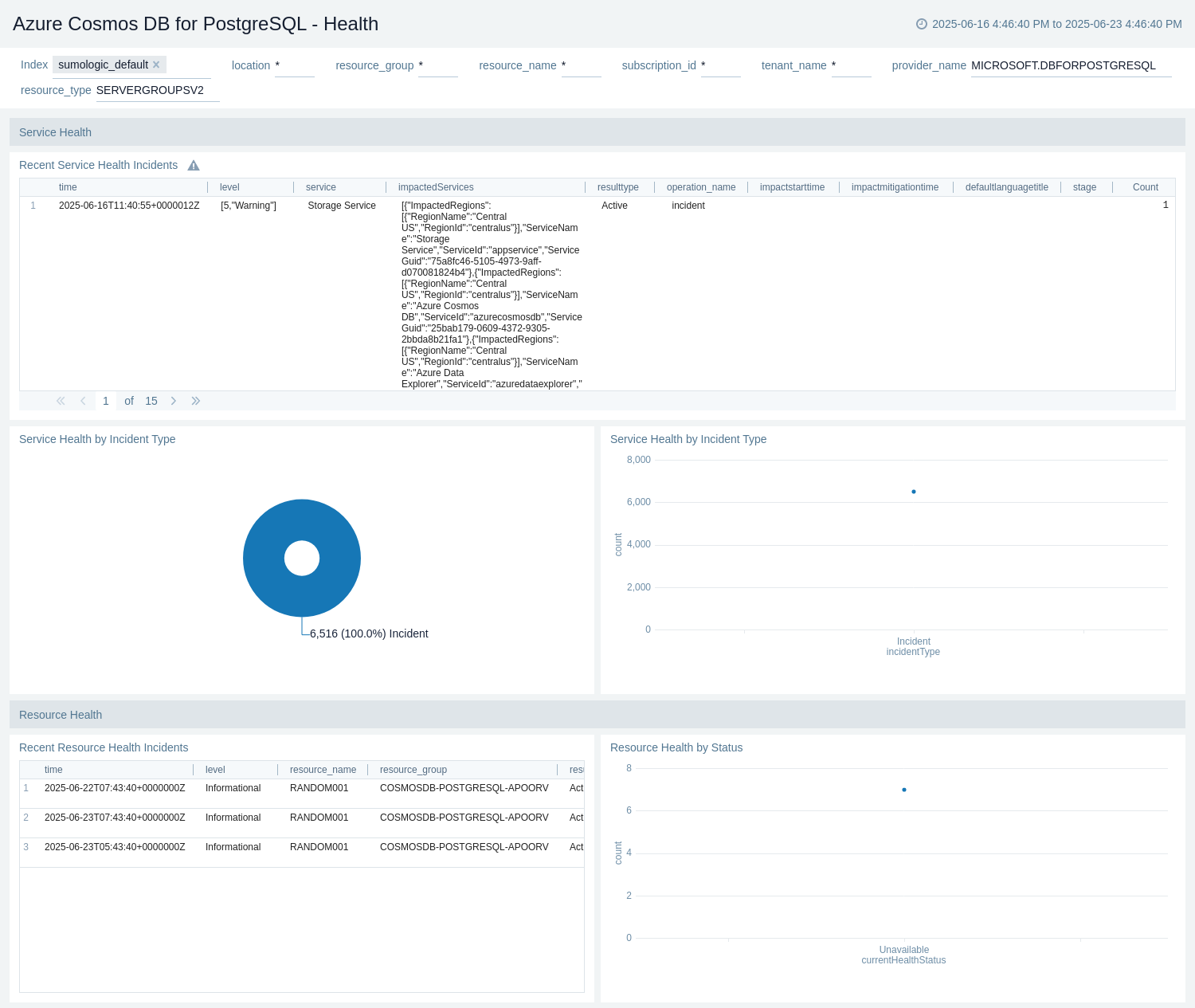
Administrative Operations
The Azure Cosmos DB for PostgreSQL - Administrative Operations dashboard provides details on users performing admin operations.
Use this dashboard to:
- Identify top users performing administrative operations.
- View top 10 operations that caused the most errors.
- View recent diagnostic, network, and replication settings updates operations.
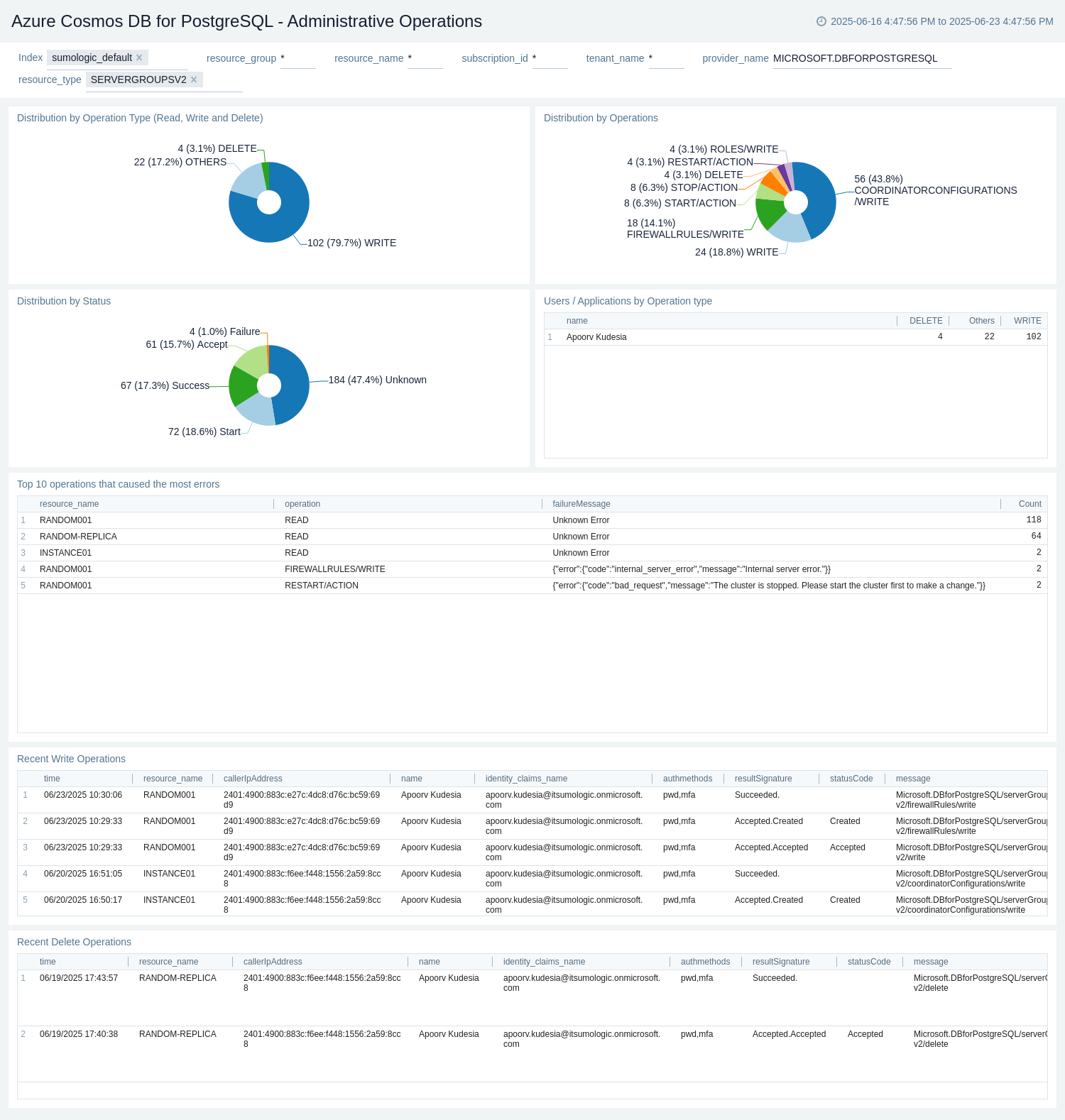
Upgrade/Downgrade the Azure Cosmos DB for PostgreSQL app (Optional)
To update the app, do the following:
Next-Gen App: To install or update the app, you must be an account administrator or a user with Manage Apps, Manage Monitors, Manage Fields, Manage Metric Rules, and Manage Collectors capabilities depending upon the different content types part of the app.
- Select App Catalog.
- In the Search Apps field, search for and then select your app.
Optionally, you can identify apps that can be upgraded in the Upgrade available section. - To upgrade the app, select Upgrade from the Manage dropdown.
- If the upgrade does not have any configuration or property changes, you will be redirected to the Preview & Done section.
- If the upgrade has any configuration or property changes, you will be redirected to the Setup Data page.
- In the Configure section of your respective app, complete the following fields.
- Field Name. If you already have collectors and sources set up, select the configured metadata field name (eg _sourcecategory) or specify other custom metadata (eg: _collector) along with its metadata Field Value.
- Click Next. You will be redirected to the Preview & Done section.
Post-update
Your upgraded app will be installed in the Installed Apps folder and dashboard panels will start to fill automatically.
See our Release Notes changelog for new updates in the app.
To revert the app to a previous version, do the following:
- Select App Catalog.
- In the Search Apps field, search for and then select your app.
- To version down the app, select Revert to < previous version of your app > from the Manage dropdown.
Uninstalling the Azure Cosmos DB for PostgreSQL app (Optional)
To uninstall the app, do the following:
- Select App Catalog.
- In the 🔎 Search Apps field, run a search for your desired app, then select it.
- Click Uninstall.
Create monitors for Azure Cosmos DB for PostgreSQL
From your App Catalog:
- From the Sumo Logic navigation, select App Catalog.
- In the Search Apps field, search for and then select your app.
- Make sure the app is installed.
- Navigate to What's Included tab and scroll down to the Monitors section.
- Click Create next to the pre-configured monitors. In the create monitors window, adjust the trigger conditions and notifications settings based on your requirements.
- Scroll down to Monitor Details.
- Under Location click on New Folder.
note
By default, monitor will be saved in the root folder. So to make the maintenance easier, create a new folder in the location of your choice.
- Enter Folder Name. Folder Description is optional.
tip
Using app version in the folder name will be helpful to determine the versioning for future updates.
- Click Create. Once the folder is created, click on Save.
Azure Cosmos DB for PostgreSQL alerts
These alerts are metrics-based and will work for all Cosmos DB PostgreSQL instances.
| Alert Name | Description | Alert Condition | Recover Condition |
|---|---|---|---|
Azure Cosmos DB for PostgreSQL - CPU Percent | This alert is triggered when CPU usage spikes above 80% are detected for any Azure Cosmos DB for PostgreSQL instance. | Count > 80 | Count =< 70 |
Azure Cosmos DB for PostgreSQL - Memory Percentage | This alert is triggered when average Memory utilization spikes above 80% are detected for any Azure Cosmos DB for PostgreSQL instance. | Count > 80 | Count =< 70 |
Azure Cosmos DB for PostgreSQL - Storage Percentage | This alert is triggered when storage percentage goes above 70% for any Azure Cosmos DB for PostgreSQL instance. | Count > 80 | Count =< 70 |
Troubleshooting
Metrics collection via Azure Metrics Source
To troubleshoot metrics collection via Azure Metrics Source, follow the instructions in Troubleshooting Azure Metrics Source.